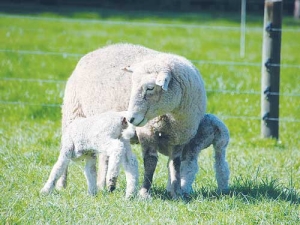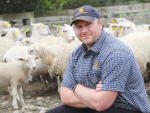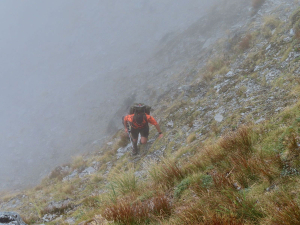Massey University's International Sheep Research Centre has for ten years researched top tips for lambing -- getting the most out of a sheep flock after a hard winter.
The harsher conditions over the winter period mean the usual target of 1200-1400kgDM/ha for pregnant ewes during lambing and lactation may not be achievable for many farmers.
Sheep lecturer Dr Rene Corner-Thomas says the best strategy for utilising available pasture is to prioritise stock classes. Pay attention to light ewes with a body condition score of 2.5 or lower. Also a priority are ewes that have multiple lambs. Of particular importance are light ewes with multiple lambs. They should be given the greatest priority, she adds.
Stocking rates should match pasture growth which is usually 10-12 ewes/ha based on the amount of metabolisable energy in the grass. Lamb survival will also be increased by choosing appropriate lambing paddocks.
Corner-Thomas says based on experience from previous years farmers will intrinsically know which of their paddocks is most successful for lambing. But it will help to choose paddocks that are flat with shelter and have no creeks and other hazards.
Finally, the research centre (part funded by Beef + Lamb New Zealand and the C. Alma Baker Trust) has shown that grazing ewes on a herb mix -- which includes chicory, plantain and both red and white clover – results in greater milk production and better twin and triplet lamb growth and survival to weaning.
In a study of ewe hoggets grazed on herb pastures during lambing and lactation, the lambs grew at 360g/day from birth to weaning. In the second year of the study the lambs born on the herb mix also had better survival than lambs born on ryegrass pasture.
However, Corner-Thomas warns farmers to take care.
“It’s not recommended to lamb ewes on the herb mix and then take them off. These herb mixes are high in calcium so any sudden shift back to ryegrass may mean they may lack calcium, resulting in ewes going down with milk fever,” she explains. “So once ewes are on the herb mix they need to remain on it until after the peak of lactation” (four weeks after birth).
Corner-Thomas adds that if the herb mixes are not ready to graze at the start of lambing, the best strategy is to put ewes on the pasture until after the peak of lactation and then allow ewes to become accustomed to the new feed slowly. Ewes should be introduced to the herb mix over a week by slowly increasing the time they are on it. The first day should be only a few hours slowly increasing the duration.
“Sheep are quite conservative grazers, so they need a while to get used to it.”
Scientists from the sheep research centre will run trials this spring to glean more information for farmers looking to try the herb mixes.
Corner-Thomas will investigate lambing twin hoggets on the herb mix, and the use of the mix to wean lambs a month earlier than normal. Dr Lydia Cranston will research the use of the herb mixes on hill country for early weaning of twin lambs.


















